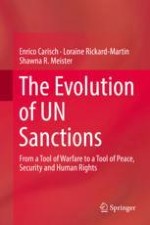2017 | OriginalPaper | Buchkapitel
2. Creating the Security Council and Its Sanctions System
verfasst von : Enrico Carisch, Loraine Rickard-Martin, Shawna R. Meister
Erschienen in: The Evolution of UN Sanctions
Aktivieren Sie unsere intelligente Suche, um passende Fachinhalte oder Patente zu finden.
Wählen Sie Textabschnitte aus um mit Künstlicher Intelligenz passenden Patente zu finden. powered by
Markieren Sie Textabschnitte, um KI-gestützt weitere passende Inhalte zu finden. powered by
